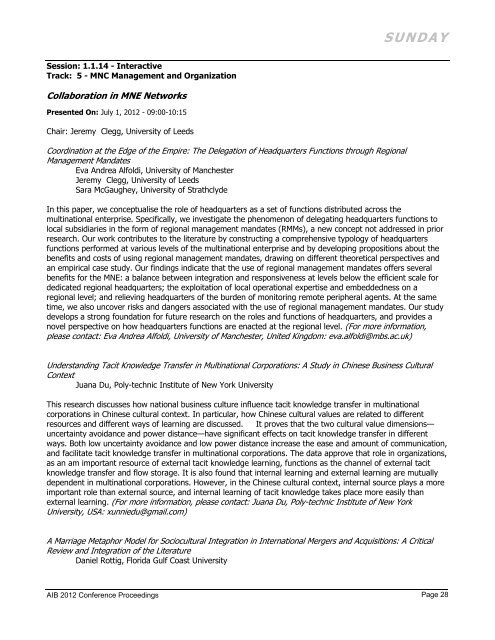AIB 2012 Conference Proceedings - Academy of International ...
AIB 2012 Conference Proceedings - Academy of International ...
AIB 2012 Conference Proceedings - Academy of International ...
You also want an ePaper? Increase the reach of your titles
YUMPU automatically turns print PDFs into web optimized ePapers that Google loves.
SUNDAY<br />
Session: 1.1.14 - Interactive<br />
Track: 5 - MNC Management and Organization<br />
Collaboration in MNE Networks<br />
Presented On: July 1, <strong>2012</strong> - 09:00-10:15<br />
Chair: Jeremy Clegg, University <strong>of</strong> Leeds<br />
Coordination at the Edge <strong>of</strong> the Empire: The Delegation <strong>of</strong> Headquarters Functions through Regional<br />
Management Mandates<br />
Eva Andrea Alfoldi, University <strong>of</strong> Manchester<br />
Jeremy Clegg, University <strong>of</strong> Leeds<br />
Sara McGaughey, University <strong>of</strong> Strathclyde<br />
In this paper, we conceptualise the role <strong>of</strong> headquarters as a set <strong>of</strong> functions distributed across the<br />
multinational enterprise. Specifically, we investigate the phenomenon <strong>of</strong> delegating headquarters functions to<br />
local subsidiaries in the form <strong>of</strong> regional management mandates (RMMs), a new concept not addressed in prior<br />
research. Our work contributes to the literature by constructing a comprehensive typology <strong>of</strong> headquarters<br />
functions performed at various levels <strong>of</strong> the multinational enterprise and by developing propositions about the<br />
benefits and costs <strong>of</strong> using regional management mandates, drawing on different theoretical perspectives and<br />
an empirical case study. Our findings indicate that the use <strong>of</strong> regional management mandates <strong>of</strong>fers several<br />
benefits for the MNE: a balance between integration and responsiveness at levels below the efficient scale for<br />
dedicated regional headquarters; the exploitation <strong>of</strong> local operational expertise and embeddedness on a<br />
regional level; and relieving headquarters <strong>of</strong> the burden <strong>of</strong> monitoring remote peripheral agents. At the same<br />
time, we also uncover risks and dangers associated with the use <strong>of</strong> regional management mandates. Our study<br />
develops a strong foundation for future research on the roles and functions <strong>of</strong> headquarters, and provides a<br />
novel perspective on how headquarters functions are enacted at the regional level. (For more information,<br />
please contact: Eva Andrea Alfoldi, University <strong>of</strong> Manchester, United Kingdom: eva.alfoldi@mbs.ac.uk)<br />
Understanding Tacit Knowledge Transfer in Multinational Corporations: A Study in Chinese Business Cultural<br />
Context<br />
Juana Du, Poly-technic Institute <strong>of</strong> New York University<br />
This research discusses how national business culture influence tacit knowledge transfer in multinational<br />
corporations in Chinese cultural context. In particular, how Chinese cultural values are related to different<br />
resources and different ways <strong>of</strong> learning are discussed. It proves that the two cultural value dimensions—<br />
uncertainty avoidance and power distance—have significant effects on tacit knowledge transfer in different<br />
ways. Both low uncertainty avoidance and low power distance increase the ease and amount <strong>of</strong> communication,<br />
and facilitate tacit knowledge transfer in multinational corporations. The data approve that role in organizations,<br />
as an am important resource <strong>of</strong> external tacit knowledge learning, functions as the channel <strong>of</strong> external tacit<br />
knowledge transfer and flow storage. It is also found that internal learning and external learning are mutually<br />
dependent in multinational corporations. However, in the Chinese cultural context, internal source plays a more<br />
important role than external source, and internal learning <strong>of</strong> tacit knowledge takes place more easily than<br />
external learning. (For more information, please contact: Juana Du, Poly-technic Institute <strong>of</strong> New York<br />
University, USA: xunniedu@gmail.com)<br />
A Marriage Metaphor Model for Sociocultural Integration in <strong>International</strong> Mergers and Acquisitions: A Critical<br />
Review and Integration <strong>of</strong> the Literature<br />
Daniel Rottig, Florida Gulf Coast University<br />
<strong>AIB</strong> <strong>2012</strong> <strong>Conference</strong> <strong>Proceedings</strong><br />
Page 28

















